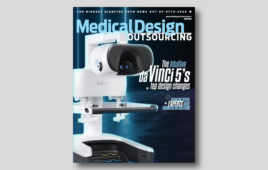 A new study of Respicardia’s Remede central sleep apnea (CSA) implant showed long-term safety and sustained improvement in sleep metrics in adults with moderate to severe central sleep apnea.
A new study of Respicardia’s Remede central sleep apnea (CSA) implant showed long-term safety and sustained improvement in sleep metrics in adults with moderate to severe central sleep apnea.
The pivotal trial followed patients implanted with Minnetonka, Minn.-based Respicardia’s phrenic nerve stimulation system for 36 months. Sleep metrics and safety were evaluated at 24 months (full overnight, in-lab, attended polysomnogram) and 36 months (home sleep study of cardiorespiratory polygraphy). An article about the study has been accepted for publication in Oxford University Press’ journal Sleep.
The results at 24 months include:
-
- 99% reduction in the median of the central apnea index (CAI) from baseline.
- 93% of patients had a reduction in the apnea-hypopnea index (AHI) from baseline.
- 59% reduction in the median arousal index from baseline.
- Improved rapid eye movement (REM) sleep and the percentage and minutes of sleep with oxygen saturation less than 90%, which is an independent predictor of all-cause mortality in chronic heart failure.
- 90% of patients were free from serious adverse events associated with the implant procedure, the Remede system or delivered therapy through 24 months. No additional related serious adverse events were reported between 24 and 36 months.
The control arm showed similar results once therapy was activated after a pre-specified 6-month randomization period. The improvement in sleep metrics for both groups was sustained and consistent at 36 months.
“It is imperative that we understand the long-term results of phrenic nerve stimulation since CSA and its underlying disorders are chronic and progressive,” said first author Dr. Henrik Fox, senior cardiologist at Ruhr-Universität Bochum, Bad Oeynhausen, Germany. “The durability of the clinical results seen in this trial further validates the remedē System as an effective, reliable, long-term treatment option for indicated patients.”
Respicardia also announced initial enrollments in a five-year 500-patient study of Remede in the U.S. and Europe. The new study will evaluate changes in sleep metrics, daytime sleepiness, quality of life and, for patients with heart failure, core-lab determined cardiac remodeling biomarkers as well as functional capacity.
“We are dedicated to offering physicians and their patients a clinically proven CSA treatment option with long-term safety and benefits,” said Respicardia president & CEO Peter Sommerness in a news release. “The three-year data from the IDE pivotal trial combined with the initiation of the rēST study further strengthens our clinical foundation and supports our commitment to improving patient outcomes.”




![A photo of the Medtronic GI Genius ColonPro polyp detection system flagging a potential sign of colon cancer during a colonoscopy. [Photo courtesy of Medtronic]](https://www.medicaldesignandoutsourcing.com/wp-content/uploads/2024/04/Medtronic-GI-Genius-doctors-268x170.jpg)